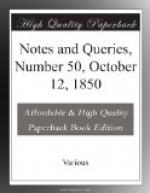K.
Fool or a Physician—Rising and Setting Sun (Vol. i., p. 157.).—The inquiry of your correspondent C. FORBES, respecting the authorship of the two well-known sayings on these subjects, seems to have received no reply. He thinks that we owe them both to that “imperial Macchiavel, Tiberius.” He is right with respect to the one, and wrong with regard to the other. The saying, “that a man after thirty must be either a fool or a physician,” had, as it appears, its origin from Tiberius; but the observation that “more worship the rising than the setting sun,” is to be attributed to Pompey.
Tacitus says of Tiberius, that he was “solitus eludere medicorum artes, atque eos qui post tricesimum aetatis annum ad internoscenda corpori {316} suo utilia vel noxia alieni consilia indigerent.” Annal. vi. 46. Suetonius says: “Valetudine prosperrima usus est,—quamvis a tricesimo aetatis anno arbitratu eam suo rexerit, sine adjumento consiliove medicorum.” Tib. c. 68. And Plutarch, in his precepts de Valetudine tuenda, c. 49., says—
[Greek: “Aekousa Tiberion pote Kaisara eipein, hos anaer huper hexaekonta [sic vulgo, sed bene corrigit Lipsius ad Tac. loc. cit. triakonta] gegonos etae, kai proteinon iatro cheira, katagelastos estin.”]
These passages sufficiently indicate the origin of the saying; but who first gave it the pointed form in which we now have it, by coupling fool with physician, I am not able to tell.
The authority for giving the other saying to Pompey, is Plutarch, who says that when Pompey, after his return from Africa, applied to the senate for the honour of a triumph, he was opposed by Sylla, to whom he observed, [Greek: “Oti ton aelion anatellonta pleiones ae duomenon proskunousin,”] that more worship the rising than the setting sun—intimating that his own power was increasing, and that of Sylla verging to its fall. (Vit. Pomp. c. 22.)
J.S.W.
Stockwell, Sept. 7.
Papers of Perjury (Vol. ii., p. 182.).—In the absence of a “graphic account,” it may interest your correspondent S.R. to be referred to the two following instances of “perjurers wearing papers denoting their crime.” In Machyn’s Diary, edited by the accomplished antiquary, John Gough Nichols, Esq., and published by the Camden Society, at p. 104. occurs the following:—
“A.D. 1556, April 28th.... The sam day was sett on the pelere in Chepe iij. [men; two] was for the preuerment of wyllfull perjure, the iij. was for wyllfull perjure, with paper sett over their hedes.”
In the same works at p. 250., we have also this additional illustration:
“A.D. 1560—I.
The xij. day of Feybruary xj. men of the North was
of a quest; because they gayff
a wrong evyde [nee, and] thay
ware paper a-pon their
hedes for perjure.”
J. GOODWIN.




